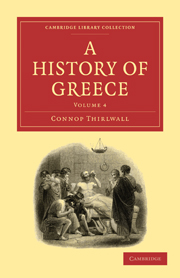Book contents
- Frontmatter
- Contents
- CHAPTER XXVII FROM THE CLOSE OF THE SICILIAN EXPEDITION TO THE BEGINNING OF THE RUPTURE BETWEEN THE SPARTANS AND ALCIBIADES
- CHAP. XXVIII FROM THE BEGINNING OF THE RUPTURE BETWEEN THE SPARTANS AND ALCIBIADES TO THE OVERTHROW OF THE FOUR HUNDRED AT ATHENS, AND THE RESTORATION OF ALCIBIADES
- CHAP. XXIX FROM THE OVERTHROW OF THE FOUR HUNDRED TO THE BATTLE OF NOTIUM
- CHAP. XXX FROM THE BATTLE OF NOTIUM TO THE END OF THE PELOPONNESIAN WAR
- CHAP. XXXI FROM THE END OF THE PELOPONNESIAN WAR TO THE REESTABLISHMENT OF DEMOCRACY AT ATHENS
- CHAP. XXXII RETROSPECTIVE SURVEY OF THE INTERNAL CONDITION OF ATHENS DURING THE PELOPONNESIAN WAR, CARRIED FORWARD TO THE RENEWAL OF HOSTILITIES BETWEEN ATHENS AND SPARTA
- CHAP. XXXIII THE EXPEDITION OF CYRUS THE YOUNGER
- CHAP. XXXIV THE RETURN OF THE GREEKS
- CHAP. XXXV FROM THE RENEWAL OF HOSTILITIES BETWEEN SPARTA AND PERSIA TO THE DEATH OF LYSANDER
- CHAP. XXXVI FROM THE DEATH OF LYSANDER TO THE PEACE OF ANTALCIDAS
- APPENDIX
CHAP. XXIX - FROM THE OVERTHROW OF THE FOUR HUNDRED TO THE BATTLE OF NOTIUM
Published online by Cambridge University Press: 05 July 2011
- Frontmatter
- Contents
- CHAPTER XXVII FROM THE CLOSE OF THE SICILIAN EXPEDITION TO THE BEGINNING OF THE RUPTURE BETWEEN THE SPARTANS AND ALCIBIADES
- CHAP. XXVIII FROM THE BEGINNING OF THE RUPTURE BETWEEN THE SPARTANS AND ALCIBIADES TO THE OVERTHROW OF THE FOUR HUNDRED AT ATHENS, AND THE RESTORATION OF ALCIBIADES
- CHAP. XXIX FROM THE OVERTHROW OF THE FOUR HUNDRED TO THE BATTLE OF NOTIUM
- CHAP. XXX FROM THE BATTLE OF NOTIUM TO THE END OF THE PELOPONNESIAN WAR
- CHAP. XXXI FROM THE END OF THE PELOPONNESIAN WAR TO THE REESTABLISHMENT OF DEMOCRACY AT ATHENS
- CHAP. XXXII RETROSPECTIVE SURVEY OF THE INTERNAL CONDITION OF ATHENS DURING THE PELOPONNESIAN WAR, CARRIED FORWARD TO THE RENEWAL OF HOSTILITIES BETWEEN ATHENS AND SPARTA
- CHAP. XXXIII THE EXPEDITION OF CYRUS THE YOUNGER
- CHAP. XXXIV THE RETURN OF THE GREEKS
- CHAP. XXXV FROM THE RENEWAL OF HOSTILITIES BETWEEN SPARTA AND PERSIA TO THE DEATH OF LYSANDER
- CHAP. XXXVI FROM THE DEATH OF LYSANDER TO THE PEACE OF ANTALCIDAS
- APPENDIX
Summary
While the revolution just described was taking place, the operations of the hostile fleets, which had hitherto been opposed to each other on the south coast of Ionia, were transferred to a new theatre of war. The Peloponnesians found Tamos no more attentive to their wants than Tissaphernes had been; and at length even the scanty and irregular supplies which they at first received, wholly ceased. At the same time Mindarus was informed by despatches both from Philippus, and from another Spartan named Hippocrates, who had been sent to Phaselis, that it was now evident Tissaphernes had no intention of fulfilling his promise with regard to the Phœnician fleet. He therefore resolved to accept the invitation of Pharnabazus, who continued to urge him to bring up his whole force to the Hellespont, and effect the revolt of all the other towns which remained subject to Athens in the satrap's province. Having first despatched Dorieus with thirteen galleys to Rhodes, where some movements were apprehended from the party adverse to the Peloponnesian or aristocratical interest, he set sail from Miletus with seventy-three galleys. His orders for sailing were given so suddenly as to prevent any notice of his design from being conveyed to the enemy. But having, like Clearchus, put out into the open sea to escape observation, he was driven by a gale to the isle of Icarus, and detained there five or six days, but at length arrived safe at Chios.
- Type
- Chapter
- Information
- A History of Greece , pp. 76 - 112Publisher: Cambridge University PressPrint publication year: 2010First published in: 1837



